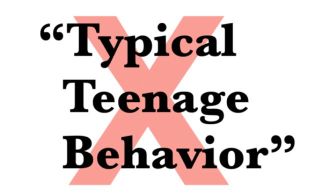Adolescence
“Typical Teenage Behavior:” Three Words We Should Ban
Poor behavior from teenagers is not a "natural" part of adolescence.
Posted May 17, 2024 Reviewed by Tyler Woods
Key points
- We do teens a disservice by assuming that their poor behavior is just a part of "typical teen behavior."
- Failing to differentiate between teens and teens who behave poorly fuels stereotypes about adolescents.
- We often dismiss teenagers' negative behavior as "typical" without considering the underlying reasons.

We use “typical teen behavior” to refer to a broad range of things our teens do, much of it unbecoming. Whenever they appear moody, stop talking to us, or resist our reminders about everything from deadlines to hygiene, our go-to explanation is that they’re just being typical teens.
But are they? Or have we just become so accustomed to thinking about adolescents as defiant and noncommunicative that we no longer take the time to try and understand what’s really going on when they seem distant from us or unhappy?
“Typical” Teen Behavior” Is Often “Troubled" Teen Behavior
Take Kayla and her mom. For the past two weeks, 16-year-old Kayla has been coming home from school in a bad mood. She snaps at her younger sister and keeps to herself all evening long—unusual behavior for this happy, outgoing kid. Attributing her daughter’s moods and withdrawal to being a typical teenager, Kayla’s mom reacts with impatience and waits for it to pass.
What Kayla’s mom doesn’t know is that her daughter is experiencing some real problems with her friends at school, who’ve been spreading rumors about her. Think about how differently things could go were Kayla’s mom to look at her daughter’s behavior outside of the convenient but misleading lens of adolescent angst.
For example, Kayla’s mom might approach Kayla with curiosity and compassion rather than with annoyance, making room for a conversation in which Kayla could share what was really going on. She might also resist the temptation to normalize Kayla’s behavior toward her sister and instead insist that Kayla treat her kindly, even though she’s struggling. Way too much mean, disrespectful, and inconsiderate behavior from teenagers gets passed off as “typical,” it’s never addressed, and as a result, these kids carry those relationship patterns into adulthood.
We set the bar so low for adolescents when they could really show up so much better. People think they become rude or difficult because they’re adolescents, but no, they go there because we let them. When we fail to see the difference between teens and teens who behave poorly, we leave room for things like inconsideration, non-communicativeness, or frank defiance to be seen as a natural part of adolescence rather than as a red flag
We Are Accountable Too
Looking at our kids through the prism of teenage stereotypes diminishes both ourselves and them. Moreover, it sets in motion that self-fulfilling prophecy of the moody, uncommunicative teen. Honestly, though, enough teenagers show such notable capacities for engagement, generosity, and reliability that we should really be thinking twice about what adolescents are truly like.
Some of the bumps in our relationships with teenagers may stem from difficulties we encounter in respecting their ideas as they develop voices, perspectives, and plans of their own. Angry tirades only alienate them, and lectures bore them.
Granted, teens are pretty good at getting their parents, therapists, and teachers to feel powerless or as if nothing they say is right. But that doesn’t mean we can’t respond with disarming candor and multiple invitations to communicate authentically and honestly.
Save being defensive for driving, and offer up your best self to the teenagers with whom your life intertwines. Be the first to respond in a way that says, I want to have a better relationship with you and am willing to look at my own behavior and change the things that are blocking that. The expression on that teenager’s face will be priceless.


